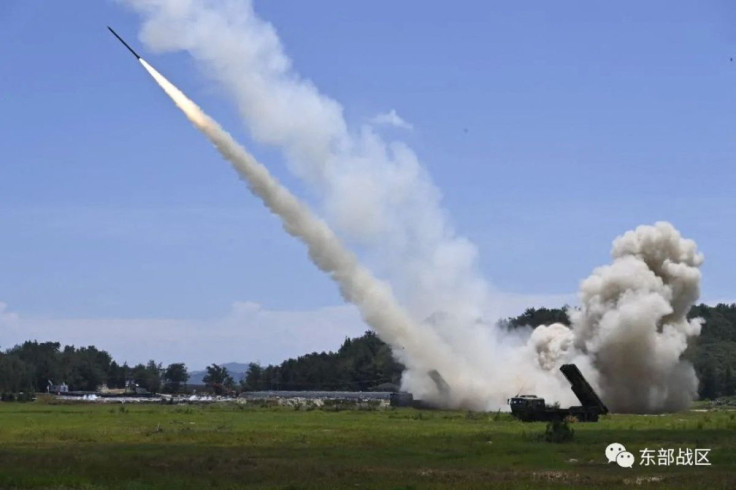Rampant Independence Activities Less Likely To Resolve Taiwan Question Peacefully: China
KEY POINTS
- China warns, the more rampant "Taiwan independence" activities, gets less likely it will be resolved peacefully
- The U.S. has said it would intervene "militarily" should China attempt an invasion of Taiwan
- Henry Kissinger has called on both countries to not put Taiwan at the center of their tense diplomatic relationship
Warning that Washington's pro-Taiwan, anti-Beijing approach could disrupt U.S.-China ties, Chinese Foreign Minister Wang Yi has said Beijing could invoke its Anti-Secession Law to seek reunification with Taiwan by force.
The Chinese Foreign Minister's warning came at a meeting with former U.S. Secretary of State Henry Kissinger in New York on Monday. The Chinese foreign minister is in New York to attend the 77th session of the United Nations General Assembly.
Wang termed the veteran diplomat as an "old friend and good friend of the Chinese people, who has [sic.] made historic contributions to the establishment and development of China-U.S. relations."
Kissinger, who as an adviser for national security affairs and as Secretary of State, was a major influence in the shaping of U.S. foreign policy from 1969 to 1976 under Presidents Richard Nixon and Gerald Ford. He is considered the architect of former president Richard Nixon's historic visit to China in 1972 and continues to be an influential voice in the shaping of the two countries' relations.
Regarding Taiwan, Wang told Kissinger, "Achieving peaceful reunification is our best wish, and we will make utmost efforts to this end. But it's noteworthy that the more rampant "Taiwan independence" activities are, the less likely it is to resolve the Taiwan question peacefully," a statement by the Chinese foreign ministry said Tuesday.
During his meeting, Wang also referred to a Chinese saying, "To defend even an inch of land, a country will not hesitate to sacrifice one thousand soldiers."
"The saying reflects the will and resolve of the Chinese people. If the Anti-Secession Law is violated, China will surely, in accordance with the law, take firm actions to safeguard national sovereignty and territorial integrity," the foreign ministry's statement added.
China's Anti-Secession Law passed in 2005 provides Beijing with a legal framework to use non-peaceful means against pro-independence forces in Taiwan. However, Beijing has remained vague about when and under what circumstances the law would be invoked.
Although the law itself does not change anything about China's long-held position regarding Taiwan, which Beijing considers to be a renegade province, it sought to add a solemn force of law to the long-held goal of the reunification of the island with the mainland.
The Chinese foreign minister stressed that "to maintain peace and stability across the Taiwan Strait, the U.S. should earnestly return to the original meaning of the one-China principle, and unequivocally oppose and curb "Taiwan independence" activities," the statement further added.
China has long regarded Taiwan as a province that must be reunited with the mainland, by force if necessary, even though the island has governed itself as a democracy.
At a World Economic Forum event in May, Kissinger called upon the U.S. and China, as the world's largest economies, to avoid direct confrontation in the interest of world peace, saying both countries must not put Taiwan at the center of their tense diplomatic relationship.
Pointing out that he had "negotiated the understanding on Taiwan at the very beginning of the US-Chinese relationship," Kissinger said at the event that it was "essential that these principles be maintained, and the U.S. should not by subterfuge or a gradual process, develop something of a two-China solution, but that China will continue to exercise patience that has been exercised up to now."
Following the rise in tensions between China and Taiwan since House Speaker Nancy Pelosi visited Taipei in August, after which it responded by ordering several days of military drills, China is also angered by developments in Washington that it believes indicate a shift in U.S. policy away from the long-held one-China policy toward Taiwanese independence.
Not only has President Joe Biden suggested – not for the first time – that the U.S. would intervene "militarily" should China attempt an invasion of Taiwan, the U.S. Senate committee has recently approved the Taiwan Policy Act of 2022, which Beijing says "seriously breaches" Washington's commitment to Beijing on Taiwan and violates the one-China policy.
The legislation, which lays out sanctions against China if it uses force to try to seize Taiwan, includes provisions to significantly enhance U.S. military support to Taipei, bringing about the most comprehensive restructuring of the U.S. policy toward the island since the Taiwan Relations Act of 1979.

© Copyright IBTimes 2025. All rights reserved.





















